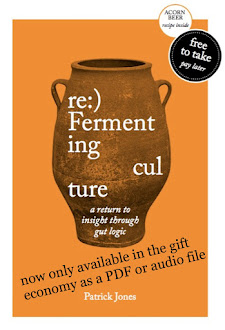Reclaiming education as ecological knowledges
Saturday, December 15, 2012
How do we move from citizens, consumers back to ecozens
Tuesday, December 11, 2012
I thought I was clever coming up with the term 'ecozen' today to describe a participant or player within an ecology, but a quick search shows it is already used as a brand by several global businesses from synthetic pools to chemical companies. It seems today greenwashing and astroturfing occurs even before a thing exists or is named; such is the rapaciousness of progress-capitalism.
The word 'citizen' etymologically refers to a city dweller. But as cities are only responsible for half the world's human population, and account for 75% of global energy consumption and 80% of Greenhouse gas emissions, I think it's time to rethink its use despite already being superseded by the far more violent term 'consumer'. Words form us as much as we form them. To be clear about words and our choice of them is to be clear about who we are, what we are saying and how we are treading.
The word 'ecozen' simply means place dweller, which can be extended to mean inhabitant or being of place.
But all this is a rather slow and musing segue into sharing the main critical premises for my forthcoming book, Walking for Food: regaining permapoesis. I'm three years into writing it, which pretty much spans the life of this blog.
Here they are:
Life is uncertain and human ideologies are consistently flawed, but there are a few things we can be clear about:
1. Life is made and unmade within ecological communities; ‘man-made mass death’ is an interruption to life.
2. We are born animal, we require animal protein from birth, we excrete animal wastes, and we die animal. None of this need involve cruelty, markets or pollution.
3. Real wealth comes from the land; it is generative and relational, and non-extractive.
4. Poverty is a construction of private property and abstract systems of wealth. The answer to poverty involves free access to land and to local knowledges.
5. Energy, and its degrees of availability, shapes all life.
6. Life is not progressive but rather performs in waves of ascent and descent.
7. Sustainable societies foreground ecological knowledge and background technology and labour.
8. Sustainable societies produce no waste and do not engineer ecological overshoot.
9. Complex societies are primarily products of high energy availability, not superior intelligence.
10. Complex societies are rarely sustaining for long periods because they are inherently wasteful and destructive.
11. Mainstream thought promotes pollution, greed, narrow self-interest and shortsightedness, but rarely recognises itself as being ideological.
12. Science is merely an extension of humanism when it is accountable to industry’s imperatives.
13. Western culture, and those under its influence, operates as a doubling performance looping mastery and amnesia.
14. Climate change is a product of unsustainable development, driven by energy availability and market capitalism.
15. Governments control so as corporations can more effectively exploit; this is sophisticated violence.
16. Non-procreation doesn’t solve overpopulation, rather perpetuates the myth humans are not really animals.
17. Reckless procreation is a thing of ignoring limits or being under stress.
18. Love is a thing that cannot be measured or treated; it is always relational and generative, never extractive and violent.
19. Perennial food ecologies produce and return nutrients in place. Conventional annual agriculture mines the soil and requires the transportation of other mined inputs for synthetic succession.
20. A weed is a plant in the wrong place, according to anthropocentrism.
21. A sensible life involves the senses. In a violent and interrupting society sight dominates the other senses.
22. Schools perpetuate ideologies of mass control; they explicitly teach children how to veil or normalise mass violence by becoming conformist cosmopolitan consumers.
23. Being born is regarded a medical emergency. Infants are rushed into life in an ambience of hysteria.
24. Dying today is prolonged, passive and drugged. Bodies are either burnt as carbon or buried and released as methane. In either case death becomes pollution.
The following people helped form such views: Derrick Jensen, Peter Minter, Deborah Bird Rose, Bernard Stiegler, David Holmgren, Masanobu Fukuoka, John Zerzan, David Graeber, David Fleming, John Michael Greer and Vandana Shiva. Read more...
Dja Dja Wurrung web resources now online
Friday, December 7, 2012
A new site for Jaara people (Dja Dja Wurrung) is now online and the traditional owners are presenting some great information and short videos, such as this one:
Reading with Australia's favourite redneck (and scone fresser)
Monday, December 3, 2012
A reading with Les Murray in Melbourne yesterday took me back to an afternoon in my youth where I came home from school to find a large poet sitting at our kitchen table eating his way through a bowl of scones mum had just cooked. My mother was the president of the local literary society and had invited Les to come share his words with the community. Although I did go to the CWA tea rooms that night in 1984 (or was it 83?), my hungry teenage mind wouldn't leave the lost scones for the poems. Yesterday, all these years later I actually got to hear his words in relative peace.
 |
| Les Murray at the Butterfly Club for the 4W launch Melbourne Dec 2012 |
This guy for example, Pony, who has the sort of short bio you can really do something with:
Pony lives somewhere in Melbourne. He spends his time writing poetry, growing vegetables, reading, resting, hanging out and partying. And making online dating profiles and deleting them.
 |
| Pony |
 |
| Stu Hatton |
Noxious










